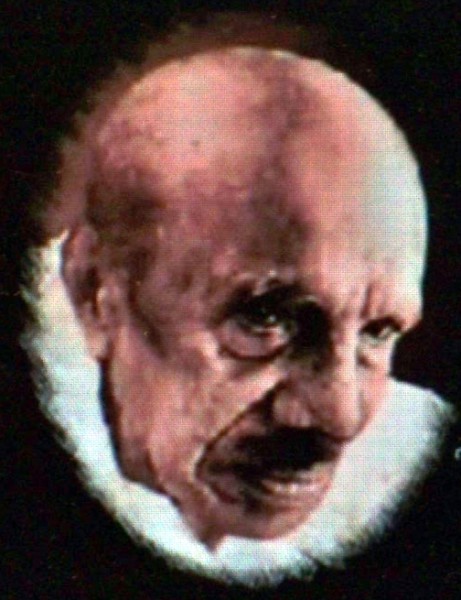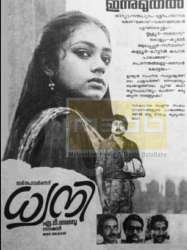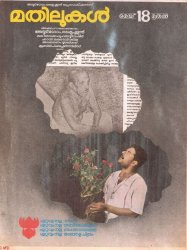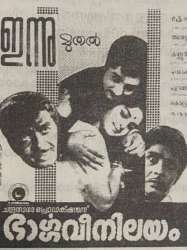Muhammad Basheer est un Acteur et Ecrivain Indien né le 19 janvier 1908

Vaikom Muhammad Basheer (21 January 1908 – 5 July 1994) was a Malayalam fiction writer from the state of Kerala in India. He was a humanist, freedom fighter, novelist and short story writer. He is noted for his path-breaking, disarmingly down-to-earth style of writing that made him equally popular among literary critics as well as the common man. He is regarded as one of the most successful and outstanding writers from India. Translations of his works into other languages have won him worldwide acclaim. His notable works include Balyakalasakhi, Shabdangal, Pathummayude Aadu, Mathilukal, Ntuppuppakkoranendarnnu, Janmadinam and Anargha Nimisham. He was awarded the Padma Shri in 1982. He is fondly remembered as the Beypore Sultan.
Basheer, born in Thalayolaparambu in northern Travancore, he was the eldest child of his parents. His father was in the timber business as a contractor, but the business did not do well enough for his large family to live in anything approaching luxury. After beginning his education at the local Malayalam medium school, he was sent to the English medium school in Vaikom, five miles away. While at school he fell under the spell of Mahatma Gandhi. He started wearing Khadar, inspired by the swadesi ideals. When Gandhi came to Vaikom to participate in the Vaikom Satyagraham (1924) Basheer went to see him. He managed to climb on to the car in which Gandhi travelled and touch his hand, a fond memory Basheer later mentioned in many of his writings. He used to visit Gandhi's Satyagraha Ashram at Vaikom daily. He got punished for going late to school due to this.
Freedom struggle involvement
He resolved to join the fight for an independent India, leaving school to do so while he was in the fifth form. Basheer was known for his perfectly secular attitude, and he treated all religions with respect. Though he used to make comments about other religions in his writings, and used to address his friends as Hindus, or even by using their cast names - reference to his work Manna and Shanka- nobody ever felt any insult because of that.
Since there was no active independence movement in Travancore or Kochi – being princely states – he went to Malabar to take part in the Salt Satyagraha in 1930. His group was arrested before they could participate in the satyagraha. Basheer was sentenced to three months imprisonment and sent to Kannur prison. He became inspired by stories of heroism by revolutionaries like Bhagat Singh, Sukhdev and Rajguru, who were executed while he was in Kannur jail. He and about 600 political prisoners then at Kannur were released after the Gandhi-Irwin pact of March 1931. Freed from prison, he organised an anti-British movement and edited a revolutionary journal, Ujjivanam ('Uprising'). A warrant was issued for his arrest and he left Kerala.
Journey
Having left Kerala, he embarked upon a long journey that took him across the length and breadth of India and to many places in Asia and Africa for seven years, doing whatever work that seemed likely to keep him from starvation. His occupations ranged from that of a loom fitter, fortune teller, cook, newspaper seller, fruit seller, sports goods agent, accountant, watchman, shepherd, hotel manager to living as an ascetic with Hindu saints and Sufi mystics in their hermitages in Himalayas and in the Ganges basin, following their customs and practices, for more than five years. There were times when, with no water to drink, without any food to eat, he came face to face with death.
After doing menial jobs in cities such as Ajmer, Peshawar, Kashmir and Calcutta, Basheer returned to Ernakulam in the mid-1930s. While trying his hands at various jobs, like washing vessels in hotels, he met a manufacturer of sports goods from Sialkot who offered him an agency in Kerala. And Basheer returned home to find his father's business bankrupt and the family impoverished. He started working as an agent for the Sialkot sports company at Ernakulam. But he lost the agency when a bicycle accident incapacitated him temporarily. On recovering, he resumed his endless hunt for jobs. He walked into the office of a newspaper Jayakesari whose editor was also its sole employee. He did not have a position to offer, but offered to pay money if Basheer wrote a story for the paper. Thus Basheer found himself writing stories for Jayakesari and it was in this paper that his first story "Ente Thankam" (My Darling) was published in the year 1937. A path-breaker in Malayalam romantic fiction, it had its heroine a dark-complexioned hunchback. His early stories were published between 1937 and 1941 in Navajeevan, a weekly published in Trivandrum in those days.
Imprisonment and after
At Kottayam (1941–42), he was arrested and put in a police station lock-up, and later shifted to another lock up in Kollam Kasba police station. The stories he heard from policemen and prisoners there appeared in later works, and he wrote a few stories while at the lock-up itself. He spent a long time in lockup awaiting trial, and after trial was sentenced to two years and six months imprisonment. He was sent to Thiruvananthapuram central jail. While at jail, he forbade M. P. Paul from publishing Balyakalasakhi. He wrote Premalekhanam (1943) while serving his term and published it on his release. Baalyakaalasakhi was published in 1944 after further revisions, with an introduction by Paul.
He then made a career as a writer, initially publishing the works himself and carrying them to homes in order to sell them. He ran two bookstalls in Ernakulam, Circle Bookhouse and later, Basheer's Bookstall.
Once India achieved control of its destiny after obtaining Independence from British rule, he showed no further interest in active politics, though concerns over morality and political integrity are present all over his works.
Well into his forties, he surprised many of his acquaintances by marrying a woman much younger than him (Fabi Basheer) and settling down to a life of quiet domesticity with his wife and two children, Anees and Shahina, in Beypore, on the southern edge of Kozhikode.
During this period he also had to suffer from mental illness and was twice admitted to mental sanatoriums. He wrote one of his most famous works, Pathummayude Aadu (Pathumma's Goat), while undergoing treatment in a mental hospital in Thrissur. The second spell of paranoia occurred after his marriage when he had settled down at Beypore. He recovered both times, and continued his writings.
He died in Beypore, on 5 July 1994.
Basheer is fondly called as Beypore Sultan (Sultan of Beypore). Though his works have been translated to English and eighteen Indian languages, the peculiarity of the language he uses makes the translations lose a lot of sheen.
Source : Wikidata
Muhammad Basheer

- Infos
- Photos
- Meilleurs films
- Famille
- Personnages
- Récompenses
Biographie
Early lifeBasheer, born in Thalayolaparambu in northern Travancore, he was the eldest child of his parents. His father was in the timber business as a contractor, but the business did not do well enough for his large family to live in anything approaching luxury. After beginning his education at the local Malayalam medium school, he was sent to the English medium school in Vaikom, five miles away. While at school he fell under the spell of Mahatma Gandhi. He started wearing Khadar, inspired by the swadesi ideals. When Gandhi came to Vaikom to participate in the Vaikom Satyagraham (1924) Basheer went to see him. He managed to climb on to the car in which Gandhi travelled and touch his hand, a fond memory Basheer later mentioned in many of his writings. He used to visit Gandhi's Satyagraha Ashram at Vaikom daily. He got punished for going late to school due to this.
Freedom struggle involvement
He resolved to join the fight for an independent India, leaving school to do so while he was in the fifth form. Basheer was known for his perfectly secular attitude, and he treated all religions with respect. Though he used to make comments about other religions in his writings, and used to address his friends as Hindus, or even by using their cast names - reference to his work Manna and Shanka- nobody ever felt any insult because of that.
Since there was no active independence movement in Travancore or Kochi – being princely states – he went to Malabar to take part in the Salt Satyagraha in 1930. His group was arrested before they could participate in the satyagraha. Basheer was sentenced to three months imprisonment and sent to Kannur prison. He became inspired by stories of heroism by revolutionaries like Bhagat Singh, Sukhdev and Rajguru, who were executed while he was in Kannur jail. He and about 600 political prisoners then at Kannur were released after the Gandhi-Irwin pact of March 1931. Freed from prison, he organised an anti-British movement and edited a revolutionary journal, Ujjivanam ('Uprising'). A warrant was issued for his arrest and he left Kerala.
Journey
Having left Kerala, he embarked upon a long journey that took him across the length and breadth of India and to many places in Asia and Africa for seven years, doing whatever work that seemed likely to keep him from starvation. His occupations ranged from that of a loom fitter, fortune teller, cook, newspaper seller, fruit seller, sports goods agent, accountant, watchman, shepherd, hotel manager to living as an ascetic with Hindu saints and Sufi mystics in their hermitages in Himalayas and in the Ganges basin, following their customs and practices, for more than five years. There were times when, with no water to drink, without any food to eat, he came face to face with death.
After doing menial jobs in cities such as Ajmer, Peshawar, Kashmir and Calcutta, Basheer returned to Ernakulam in the mid-1930s. While trying his hands at various jobs, like washing vessels in hotels, he met a manufacturer of sports goods from Sialkot who offered him an agency in Kerala. And Basheer returned home to find his father's business bankrupt and the family impoverished. He started working as an agent for the Sialkot sports company at Ernakulam. But he lost the agency when a bicycle accident incapacitated him temporarily. On recovering, he resumed his endless hunt for jobs. He walked into the office of a newspaper Jayakesari whose editor was also its sole employee. He did not have a position to offer, but offered to pay money if Basheer wrote a story for the paper. Thus Basheer found himself writing stories for Jayakesari and it was in this paper that his first story "Ente Thankam" (My Darling) was published in the year 1937. A path-breaker in Malayalam romantic fiction, it had its heroine a dark-complexioned hunchback. His early stories were published between 1937 and 1941 in Navajeevan, a weekly published in Trivandrum in those days.
Imprisonment and after
At Kottayam (1941–42), he was arrested and put in a police station lock-up, and later shifted to another lock up in Kollam Kasba police station. The stories he heard from policemen and prisoners there appeared in later works, and he wrote a few stories while at the lock-up itself. He spent a long time in lockup awaiting trial, and after trial was sentenced to two years and six months imprisonment. He was sent to Thiruvananthapuram central jail. While at jail, he forbade M. P. Paul from publishing Balyakalasakhi. He wrote Premalekhanam (1943) while serving his term and published it on his release. Baalyakaalasakhi was published in 1944 after further revisions, with an introduction by Paul.
He then made a career as a writer, initially publishing the works himself and carrying them to homes in order to sell them. He ran two bookstalls in Ernakulam, Circle Bookhouse and later, Basheer's Bookstall.
Once India achieved control of its destiny after obtaining Independence from British rule, he showed no further interest in active politics, though concerns over morality and political integrity are present all over his works.
Well into his forties, he surprised many of his acquaintances by marrying a woman much younger than him (Fabi Basheer) and settling down to a life of quiet domesticity with his wife and two children, Anees and Shahina, in Beypore, on the southern edge of Kozhikode.
During this period he also had to suffer from mental illness and was twice admitted to mental sanatoriums. He wrote one of his most famous works, Pathummayude Aadu (Pathumma's Goat), while undergoing treatment in a mental hospital in Thrissur. The second spell of paranoia occurred after his marriage when he had settled down at Beypore. He recovered both times, and continued his writings.
He died in Beypore, on 5 July 1994.
Basheer is fondly called as Beypore Sultan (Sultan of Beypore). Though his works have been translated to English and eighteen Indian languages, the peculiarity of the language he uses makes the translations lose a lot of sheen.
Le plus souvent avec
Filmographie de Muhammad Basheer (6 films)
Acteur

Dhwani (1988)
Genres Drame, Romance
Acteurs Jayaram, Shobana, Prem Nazir, Jayabharathi, Suresh Gopi, Karamana Janardanan Nair
Rôle Visitor at Hospital
Note63%





Scénariste

ബാല്യകാലസഖി (2014)
Genres Drame, Romance
Acteurs Mammootty, Isha Talwar, Meena, Seema Biswas, K. P. A. C. Lalitha, Tanu Roy
Rôle Créateur de nouvelle
Note49%






കഥവീട് (2013)
, 1h50Réalisé par Sohanlal
Genres Drame, Comédie, Romance
Acteurs Kunchacko Boban, Kavya Madhavan, Rituparna Sengupta, Bhama, Manoj K. Jayan, Paul Michael
Rôle Histoire
Note54%






Mathilukal (1990)
, 2hRéalisé par Adoor Gopalakrishnan
Genres Drame, Biographie, Romance
Acteurs Mammootty, Murali, Krishnan Kutty Nair, Sreenath, Karamana Janardanan Nair, Thilakan
Rôle Créateur de nouvelle
Note81%





Confined to the narrow space of a prison cell, Bashir falls in love with a woman in the neighbouring prison compound. They are separated by a high wall so that they never see each other and have to devise ingenious ways for communicating. Narayani, Bashir's love is presented as a female voice and never appears in person in the film.

Premalekhanam (1985)
Genres Drame, Romance
Acteurs M. G. Soman, Mala Aravindan, Captain Raju, Meena, Vincent
Rôle Histoire

ഭാർഗവി നിലയം (1964)
Réalisé par Aloysius Vincent
Genres Horreur, Romance
Acteurs Prem Nazir, Ashish Vidyarthi, Madhu, Vijaya Nirmala, P. J. Antony, Adoor Bhasi
Rôle Ecrivain
Note77%





An enthusiastic and talented novelist (Madhu) comes to stay in a desolate mansion named Bhargavi Nilayam. The novelist and his servant Cheriya Pareekkanni (Adoor Bhasi) experience the presence of a strange entity here. They come to know from the local people that it is a haunted house. The story is that it is haunted by the ghost of the daughter of the previous owner. The novelist and his servant encounter strange happenings here - the gramophone plays on its own, objects move around. The novelist finds some old letters written to Bhargavi (Vijaya Nirmala) by her lover Sasikumar (Prem Nazir). It is believed that the ghost of Bhargavi now haunts this house.
 Connexion
Connexion



